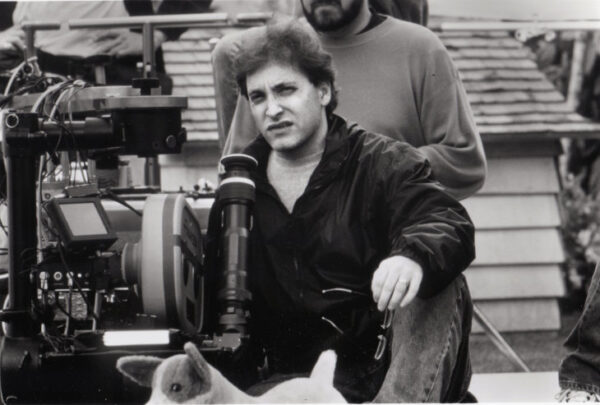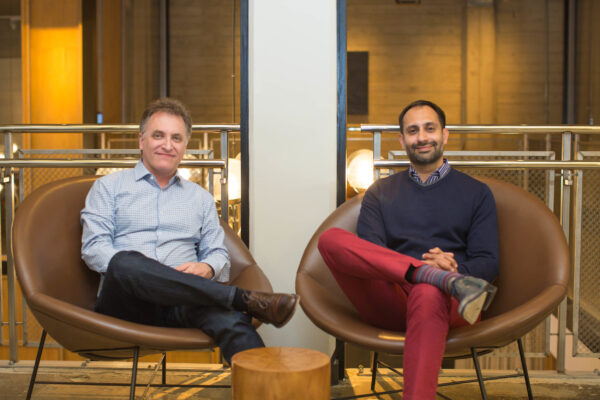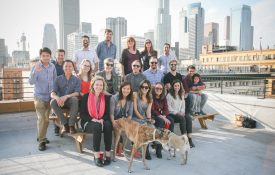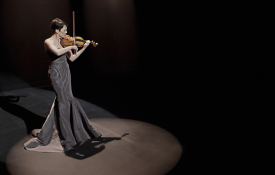Larry Guterman, Hollywood filmmaker and founder of the industry-leading, personalized audio software technology company SonicCloud, felt the creative spark from an early age. As a young child, an uncle gave him a flip book with a simple animation of a rabbit jumping out of a hat. Soon, Guterman saw his first movie, and the seeds were planted. Eventually he attended the USC School of Cinematic Arts and worked on films like Son of the Mask and Antz for Steven Spielberg and DreamWorks Animation.
Of course, the plan that he’d laid out for himself wasn’t necessarily the one that life had in store for him. I sat down with Guterman for an all-encompassing chat and he detailed how he turned a major personal challenge—hearing loss—into a significant opportunity and ultimate triumph.
A HOBBY BECOMES A PASSION; A PASSION BECOMES A CALLING
Erik Huberman: What were you passionate about as a kid?
Larry Guterman: From early on, I remember drawing. I remember one of my uncles in New York gave me a little flip book with cards of a rabbit jumping out of a hat. Then, I saw a movie when I was maybe eight or nine: Planet of the Apes with Charlton Heston, the original. I was absolutely mesmerized by that. I might have seen a few movies prior to that, but that was the one that made the biggest impression.
Huberman: Were you like, “I want to make things like this?”
Guterman: My grandfather gave me an old Super 8 camera. I started making both animated and live-action movies as a kid and just loved it. But I never thought it would be a career. It never even occurred to me back then. It never occurred to me that this was something you could do. I just did it as a hobby and made little short films.
When we moved to Toronto when I was 12, they had a Kodak laboratory where they developed film for all of Canada. There was a little kiosk across the street from our apartment building where you could go and give them the film and you would get it a week later. It’s empty now, but it was a totem. It was a symbol of the ability to kind of be transported to another place by making that film and getting it back, and you would put it up on the projector and watch it. It was amazing.

Guterman on set early career
HOW FOSTERING CONNECTIONS OPENED THE DOOR TO POSSIBILITIES
Huberman: After graduating and moving to Los Angeles, you worked in Hollywood in various capacities for years—even getting experience with Robert Zemeckis on his film, Death Becomes Her. But it was a connection from years earlier that would soon open the door.
Guterman: Glenn Williamson, who I had met as a production assistant and who used to work at Castle Rock when I first moved to L.A., was now a junior development executive at the newly formed DreamWorks. He said, “Can you give me your film?” I said OK and gave him my 35mm print. He said “I’m going to give it to Walter Parkes,” who was then the president of DreamWorks in 1995.
Every week I would call Glenn and every week he blew it off. I swear, for three months he put it off, and then he said to me in December, “The bad news is that Walter blew the film off again. The good news is I decided to give it to Steven [Spielberg]. He liked it, and he said he thought you had a good eye, and he’d like to meet.” Those were his exact words.

Guterman with Sachin Khanna
HOW ADVERSITY CAN TRANSFORM INTO A POWERFUL OPPORTUNITY
Huberman: Tell me how SonicCloud came to be.
Guterman: I had been at a very loud party my freshman year and it was so loud I had ringing in my ears for a week afterward. I went to get it checked, and I had a little bit of loss. Over the years, it deteriorated. I was using hearing aids. I thought, “Why aren’t we using this for phone calls? Why don’t we take the functionality of [the hearing aid] and stick it on the mini-supercomputer that everyone in the world is carrying around in their pocket?” It’s a better chip and wider-bandwidth audio.
That was the genesis of SonicCloud, which is a tech startup I founded when I was in prep on a movie. We were going to make this animated feature at Relativity Films, while I was working on the side and on the weekends on this tech startup idea with partners and people who came in to work for free and so forth.
Relativity Films went out of business while this was gaining traction, and we found the CEO and then raised the funds. By 2016–2017, we had a product on the App Store that we were optimizing. All of a sudden, I was switching from filmmaking to the world of tech startups.
I was an older co-founder, not the twentysomethings who were in the building at the time. I knew that this was an entirely different universe than the one I grew up in. But the thing snowballed. We started to get some traction and got some investment. Apple loved what we were doing. They wanted us to feature at the Worldwide Development Conference. If you go to the Health app there are three apps that are recommended to do your hearing test and one of them is SonicCloud.
We found during COVID, crazily enough, that the remote-work phenomenon created a business opportunity. We found that remote employees were having trouble on Zoom calls and with Google Meet. Companies were frantically trying to find what they could do to help their employees understand each other on calls better. Now, we’re helping people at work, and we’re helping them at home as well.
One of my dreams is to eventually bring this back into the world of content and entertainment. That’s really how I see combining these different initiatives to satisfy creativity in every facet.
Listen to the full interview here.
Erik Huberman is the founder and CEO of Hawke Media, a full-service performance marketing group based in Santa Monica, Calif., that launched in 2014 and has been valued at $60 million.














































